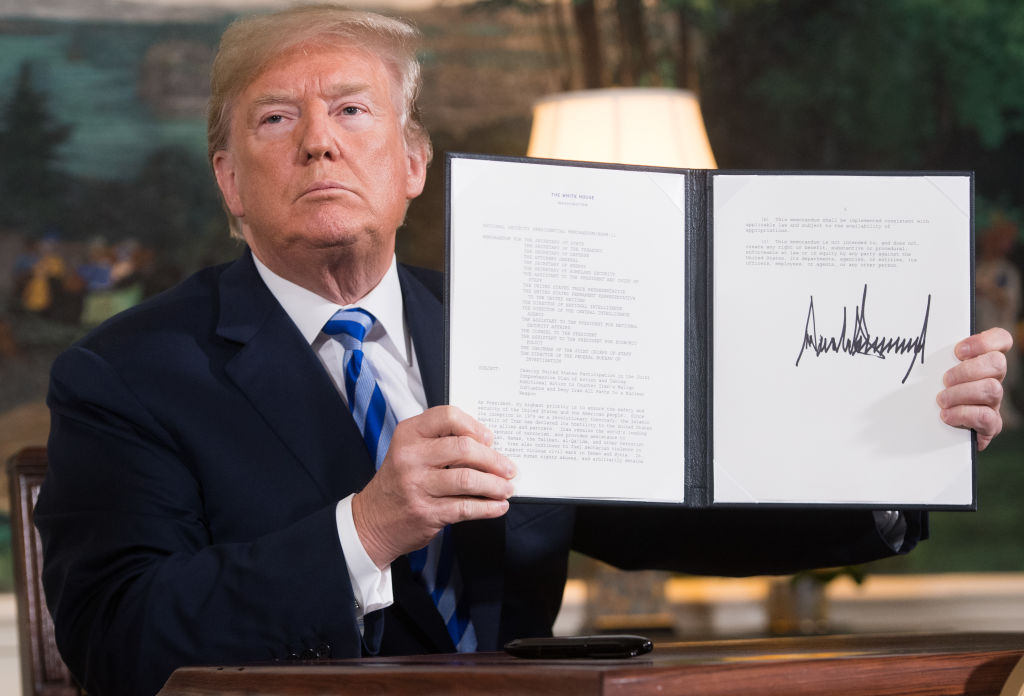On Monday, August 6, the long-arm of the U.S. Treasury Department reached into Europe and violently shook the continent. The first wave of U.S. secondary sanctions on entire sectors of the Iranian economy are now back in force, which means major European conglomerates and large-sized businesses have a potentially existential choice to make. Do we continue to do sign deals in Iran that Washington now explicitly prohibits? Or do we take the path of least resistance by removing our money from the Iranian market and saving ourselves the trouble of billions of dollars of U.S. fines, billions more in asset freezes, and severe damage to the company’s reputation?
President Donald Trump talks himself up as an unpredictable and eccentric man whose impulses keep everybody guessing, but he has been quite transparent about his hatred of the Iranian nuclear deal. Part of his schtick during the 2016 presidential campaign was to call the deal the worst ever negotiated in world history, an undeserving boon to the mullahs that gifted Tehran tens of billions of dollars in cash and renewed its access to the international financial system. Trump promised his supporters nothing less than the shredding of the accord and the return to the extreme financial pressure that he insists brought the Iranian regime to its knees. He finally made good on his promise this May, when he told the world that the United States was pulling out of the nuclear agreement and slapping all of the economic sanctions that were previously lifted.
The European Union was furious at the move, one that seemed to sacrifice good statecraft for domestic political posturing. And rightly so; by unilaterally withdrawing from the deal, Trump undermined over a decade of exhaustive diplomatic work (mostly led by the Europeans) with the Iranians on the nuclear problem. If Tehran was cheating on its commitments, Trump would have an argument on his side. The reality, however, couldn’t have been more different; the International Atomic Energy Agency, responsible for verifying Iran’s compliance to the technical 130-page deal, has reported on twelve separate occasions that the Iranian government is doing what it’s supposed to be doing. For people like EU High Commissioner Federica Mogherini, French President Emmanuel Macron, and German Chancellor Angela Merkel – all of whom were either intimately involved in the negotiations or in full support of it – Trump’s decision to leave was a self-inflicted international security crisis.
The European Union is trying its best to convince Iranian President Hassan Rouhani to stick with the agreement. Tehran, however, requires a guarantee that western capital will still be able to work in the Iranian market without being scared away. It’s a guarantee the EU can’t make with a straight face. Brussels is doing everything it can to salvage the situation, from issuing blocking regulations, allowing the European Development Bank to invest in Iran, and exploring the possibility of paying for Iranian oil with euros instead of dollars. Yet if EU officials were being honest, they’d acknowledge that European businesses will make their own decisions. Some, such as France’s Total, PSA Group, and shipping giant CMA CGM have played it conservatively and left Iran before the first round of U.S. sanctions were even introduced.
The EU may rival the U.S. as one of the world’s wealthiest players. But Trump’s single decision this May is a reminder to Europeans that Washington is still the preeminent actor with the power to compel some of the largest companies on the planet to reassess their position. While this may be a terrific boost to Trump’s sense of importance, it’s one more pinprick to a transatlantic relationship the 45th president doesn’t appear to value.






Comments